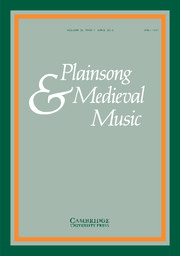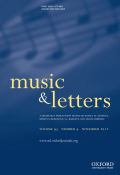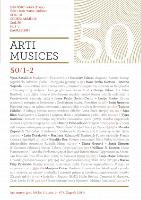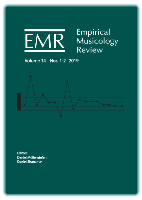
HUDEBNI VEDA
Scope & Guideline
Illuminating the Path of Music Scholarship
Introduction
Aims and Scopes
- Historical Musicology:
The journal prominently features studies that delve into the historical contexts of music, including biographies of composers, historical performances, and analyses of musical works from various periods. - Cultural and Social Contexts of Music:
Research published in the journal often emphasizes the relationship between music and cultural identity, examining how music reflects and influences social movements, political changes, and national identities. - Methodological Innovations in Music Research:
The journal encourages the exploration of new methodologies in music research, including semiotic and hermeneutic approaches, as well as the use of technology in analyzing musical works. - Music and Memory:
There is a consistent focus on how music interacts with memory, both in terms of individual experiences and collective cultural memory, often examining historical events through musical lenses. - Interdisciplinary Approaches:
The journal promotes interdisciplinary research that intersects musicology with other fields such as literature, philosophy, and visual arts, showcasing the interconnectedness of these disciplines.
Trending and Emerging
- Music and Politics:
An increasing number of papers explore the intersection of music and political discourse, particularly how music has been used as a form of resistance or propaganda during historical crises. - Music and Technology:
Research on the impact of technology on music creation, performance, and dissemination is on the rise, reflecting contemporary concerns about digital media and its effect on musical practices. - Globalization and Music Exchange:
There is a growing interest in how globalization influences music practices, with studies examining cross-cultural exchanges and the blending of musical styles from various traditions. - Music Memory and Commemoration:
Emerging themes focus on how music serves as a medium for memory and commemoration, especially regarding historical events and cultural identities, indicating a deeper inquiry into music's role in societal narratives. - Interdisciplinary Collaborations:
Research increasingly reflects interdisciplinary collaborations, with scholars integrating perspectives from sociology, anthropology, and cultural studies to enrich musicological discourse.
Declining or Waning
- Traditional Music Forms:
There has been a noticeable decrease in the publication of studies focusing solely on traditional music forms, such as folk music, indicating a potential shift towards more contemporary or hybrid styles of music. - Genre-Specific Studies:
Research that focuses exclusively on specific genres, such as classical or jazz, appears to be less frequent, suggesting a broader interest in cross-genre studies and interdisciplinary approaches. - Performance Practice in Historical Contexts:
While still relevant, articles strictly addressing historical performance practices seem to have diminished, as the journal increasingly prioritizes broader cultural and analytical perspectives. - Local Music Traditions:
There is a declining emphasis on localized studies of music traditions, suggesting a trend towards global or transnational music studies that address broader cultural exchanges.
Similar Journals

MUSICAL TIMES
Exploring the Harmonies of Academic MusicologyMUSICAL TIMES is a distinguished journal dedicated to the exploration and dissemination of scholarly works in the realm of music, serving as an essential resource for researchers, professionals, and students alike. Published by MUSICAL TIMES PUBLICATIONS LTD, this journal has built a robust reputation within the arts and humanities, specifically focusing on music studies, with an impactful reach indicated by its Scopus ranking at #73 out of 106 in the field. Though access to this journal is not open, its curated content, which spans various facets of musicology and contemporary music discourse, enriches the academic community by encouraging insightful discussions and critical analyses. With its historical roots tracing back to its inception, MUSICAL TIMES aims to foster a deeper understanding of music's cultural, social, and artistic dimensions, making it a valued publication for those engaged in the scholarly pursuit of music.

Musicologica Brunensia
Fostering Interdisciplinary Dialogue in Music StudiesMusicologica Brunensia, an esteemed journal published by Masaryk University, Faculty of Arts, serves as a significant platform for the dissemination of knowledge in the field of musicology. Based in the Czech Republic, this Open Access journal has been facilitating scholarly communication since 2009, allowing unrestricted access to its rich array of research articles. With an ISSN of 1212-0391 and an E-ISSN of 2336-436X, Musicologica Brunensia proudly holds a Q3 ranking in the Music category as of 2023, reflecting its dedication to advancing research in the arts and humanities, particularly music. The journal accepts contributions spanning diverse topics within music studies, fostering interdisciplinary dialogue among researchers, professionals, and students alike. Located at Arne Novaka 1, Brno, 60200, Czech Republic, Musicologica Brunensia is poised to continue its journey of promoting innovative scholarship in musicology until 2024 and beyond, making it a valuable resource for anyone passionate about the field.

Resonancias
Connecting Researchers Through Musical Discourse.Resonancias is a distinguished open-access journal published by the Pontificia Universidad Católica de Chile, dedicated to advancing the field of music studies. With an ISSN of 0717-3474 and an E-ISSN of 0719-5702, this journal has been promoting scholarly discourse in music since its transition to open access in 2014. Resonancias serves as a critical platform for researchers, professionals, and students alike, enabling them to disseminate knowledge and explore innovative perspectives in musicology. With its current Q2 ranking in the field of music as of 2023, and a Scopus ranking of #108 out of 180, this journal exemplifies its commitment to quality and impact within the academic community, fostering an accessible database of music research from Chile and beyond. Situated at AVENIDA VICUNA MACKENNA 4860, MACUL, SANTIAGO, CHILE, Resonancias not only promotes original research but also includes critical reviews, interviews, and essays that contribute to the rich tapestry of musical knowledge.

MUSIKTHEORIE
Catalyzing Insights in Music Composition and HistoryMUSIKTHEORIE is a pivotal journal dedicated to the field of music theory, published by LAABER-VERLAG. With its ISSN 0177-4182, this journal serves as an essential platform for scholars, educators, and practitioners interested in the multifaceted dimensions of music theory. Although it does not currently offer open access, it provides in-depth analyses and critical discourse on theoretical frameworks, compositional techniques, and historical perspectives in music. Despite its coverage in Scopus being discontinued after 2018 and ranking within the 5th percentile of Arts and Humanities - Music, MUSIKTHEORIE remains a respected publication for advancing knowledge and fostering collaboration within the musicological community. Researchers and students alike can benefit from its rich content and the insights shared within its pages.

Plainsong & Medieval Music
Charting New Territories in Musicology's PastPlainsong & Medieval Music is a prestigious journal dedicated to the study of early music, particularly plainsong and its cultural contexts, published by Cambridge University Press. Established in 1992, this journal has become a vital resource for scholars in the field of musicology, offering a platform for the dissemination of high-quality research. With an impressive Q1 ranking in the Music category for 2023, it is recognized for its significant contribution to the academic discourse surrounding medieval music traditions. While the journal does not currently offer Open Access options, its rich content, ranging from peer-reviewed articles to critical reviews, remains accessible to researchers, professionals, and students eager to deepen their understanding of this nuanced area. Residing in Cambridge, England, the journal continues to embrace innovative research methodologies, ensuring it remains at the forefront of the evolving landscape of music studies.

Studia Universitatis Babes-Bolyai Musica
Bridging Disciplines in the World of MusicStudia Universitatis Babes-Bolyai Musica is a prestigious academic journal dedicated to the field of musicology, published by UNIV BABES-BOLYAI. Since its inception, it has strived to foster scholarly communication and share groundbreaking research that spans various music-related disciplines, including ethnomusicology, music theory, and performance studies. The journal operates under an Open Access model since 2021, ensuring that its content is freely accessible to a global audience of researchers, professionals, and students interested in advancing their knowledge and understanding of music. By providing a platform for high-quality, peer-reviewed articles, Studia Universitatis Babes-Bolyai Musica plays a vital role in promoting significant contributions to the evolving discourse in music studies. Its commitment to intellectual rigor and openness aligns with contemporary academic trends, making it an essential resource in the realm of music research.

MUSIC & LETTERS
Decoding the Symphony of Literature and MusicMUSIC & LETTERS, published by Oxford University Press, is a prominent academic journal that has been at the forefront of musicology and music studies since its inception in 1920. With an ISSN of 0027-4224 and an E-ISSN of 1477-4631, the journal provides a platform for scholarly articles that explore the rich interplay between music and literature, contributing significantly to the understanding of musical context, form, and societal impact. As of 2023, it holds a respectable Q3 rank in Music within its category, positioned at Rank #66 out of 180 in the Scopus Arts and Humanities Music category. Despite not being an Open Access journal, its rigorous peer-review process and commitment to high-quality research make it an essential resource for researchers, professionals, and students alike. The journal's scope encompasses various genres and historical periods, ensuring a comprehensive examination of music's role in culture and community, thereby enhancing the scholarly discourse within this vibrant field. Based in the United Kingdom, at Great Clarendon St, Oxford OX2 6DP, England, MUSIC & LETTERS continues to inspire and inform the global music scholarly community.

Arti Musices
Exploring the Rich Tapestry of Music and HumanitiesArti Musices is a distinguished open-access journal published by the Croatian Musicological Society since 2007, dedicated to advancing the field of musicology and related arts and humanities disciplines. Operating from Zagreb, Croatia, this journal aims to provide a platform for scholarly communication, fostering international dialogue among researchers, musicologists, and practitioners. Although it has a current Scopus ranking in the bottom quartile within its category (Q4 in Music), it offers a unique perspective on the musicological landscape, particularly from a regional standpoint. Researchers seeking to contribute to or glean insights from this evolving field will find that Arti Musices serves an important role in disseminating innovative ideas and empirical research. The journal accepts submissions across a broad spectrum of music-related topics, inviting contributions that reflect the complexities and cultural contexts of music today.

Empirical Musicology Review
Exploring the Harmony of Empirical Research in MusicologyEmpirical Musicology Review is a pioneering journal in the field of musicology, published by the Ohio State University School of Music. Established as an open access journal since 2006, it aims to foster interdisciplinary research by providing a platform for scholars to disseminate empirical studies and analyses related to music. With ISSN 1559-5749, this journal plays a crucial role in expanding the understanding of music through methodological rigor and innovative practices, catering to researchers, professionals, and students alike. By promoting the accessibility of high-quality research, Empirical Musicology Review significantly contributes to the evolving landscape of music studies and enhances the global dialogue surrounding music's theoretical and practical dimensions. The journal's commitment to open access ensures that its valuable insights reach a broad audience, encouraging further exploration and collaboration within the musicology community.

Muzikoloski Zbornik
Championing Open Access in Music ScholarshipMuzikoloski Zbornik is a prominent open-access journal in the field of musicology, published by the esteemed University of Ljubljana Press since 1965. Hailing from Slovenia, this journal has been dedicated to advancing the study of musical heritage, theory, and practice, serving as a vital platform for researchers, professionals, and students alike. With a notable Q2 category ranking in the field of music and a Scopus ranking of 109 out of 180 in Arts and Humanities, Muzikoloski Zbornik showcases high-quality research, fostering discourse and collaboration among scholars globally. The journal embraces a diverse range of topics, from ethnomusicology to music education, ensuring its relevance in an ever-evolving academic landscape. By providing unrestricted access to its content, it champions the dissemination of knowledge and supports the growth of the musicology discipline.